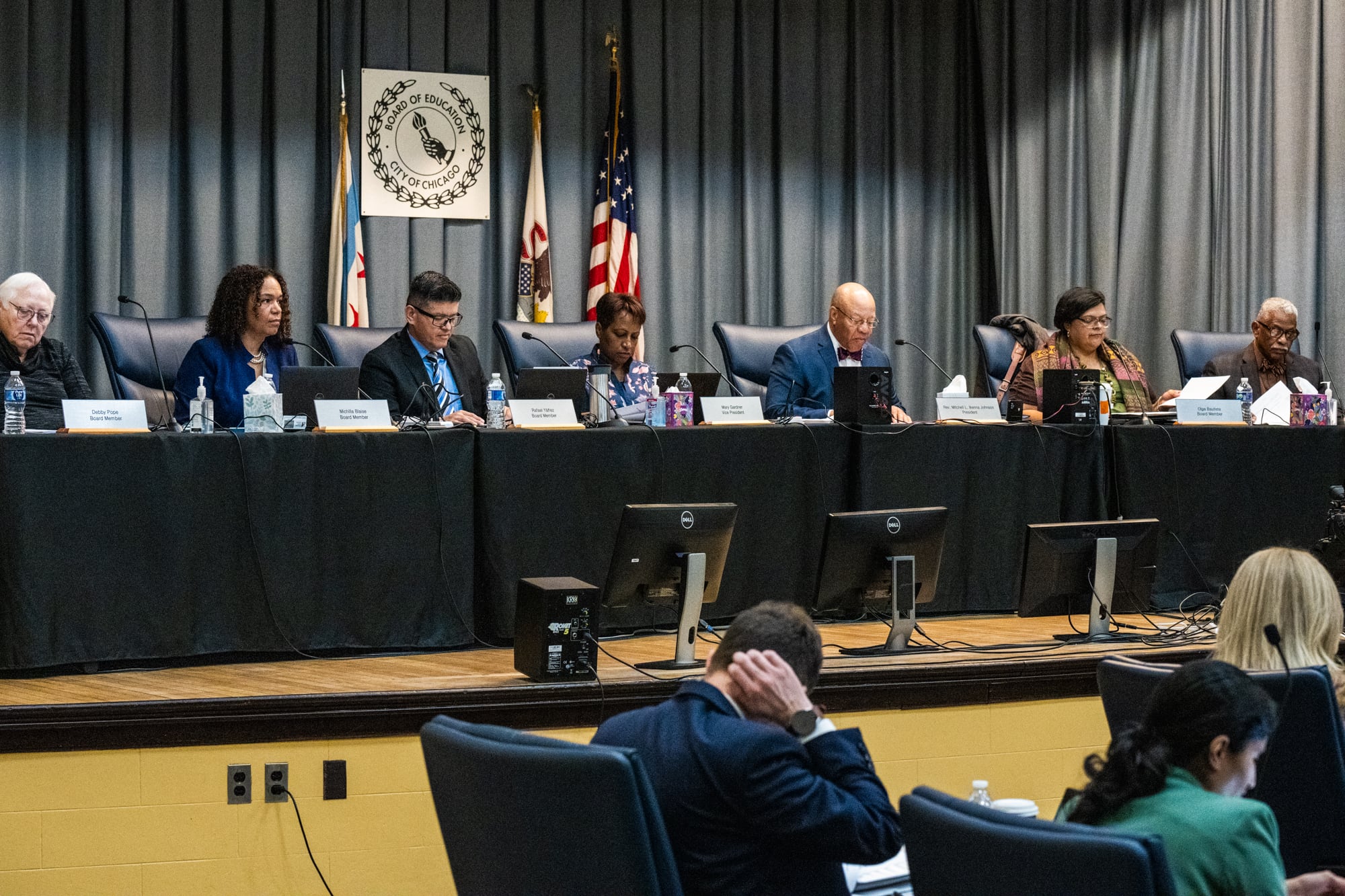Sign up for Chalkbeat Chicago’s free daily newsletter to keep up with the latest education news.
The school board that Chicago Mayor Brandon Johnson appointed earlier this month amid a dramatic leadership shakeup met for the first time Thursday. But following months of district turmoil, it was a mostly uneventful meeting at which the seven new members were sworn in and reviewed the agenda for next Friday’s meeting.
All eyes were on the new board to see if it might take action to remove Chicago Public Schools CEO Pedro Martinez amid an increasingly public clash between the schools chief and Johnson over navigating the district’s and city’s financial challenges. The entire previous board made up of mostly Johnson appointees resigned earlier this month, reportedly following pressure to oust Martinez.
But on Thursday, the new board made no open move to remove Martinez from his job. After the public portion of the meeting, the new members met behind closed doors for about 30 minutes to discuss personnel matters, but quickly adjoined the meeting after emerging from that closed session. Personnel actions generally need to go on the board’s agenda at least 48 hours before a meeting.
At Thursday’s meeting, the Rev. Mitchell Ikenna Johnson, former executive director of the Developing Communities Project, became president of the new board, and Mary Gardner, a West Side community organizer, took on the role of vice president.
Johnson praised the mayor, decried disparities in educational outcomes that Black students face, and said the district must take care of the pensions of its former employees — presumably a reference to a $175 million payment for non-teaching staff pensions that has pitted the mayor against Martinez.
The new members jointly recited the standard oath of office at the meeting’s start, vowing to promote the free expression of opinion by fellow board members, protect student and employee privacy, and respect the interests of city taxpayers as they “set the course for Chicago Public Schools.”
Board members made brief remarks after their oath, invoking their experiences as district students and parents and, in some cases, voicing admiration for Johnson and his vision for public schools. Member Michilla Blaise noted that the new board has already become intensely politicized, but she promised to bring calm and focus on the board’s important work.
“We’re here for the kids and for the families,” she said. “We’ll make sure the stage is set for greatness.”
The Johnson administration has said the board changeover was part of an orderly transition to a new partially elected board in January, made up of 11 mayoral appointees and 10 members that Chicago voters will elect on Nov. 5. But Martinez’ supporters have voiced concern that Johnson replaced a board unwilling to fire the CEO with new members prepared to remove him from his post roughly three years after former Mayor Lori Lightfoot hired him.
The mayor and the CEO have clashed over a Johnson request for the district to take on a short-term, high-interest loan to cover the cost of a teachers contract the district is now negotiating as well as the non-teaching staff pension payment to a city fund. Martinez has argued that the district must find a way to balance its budget without taking on more high-cost debt, and he has insisted the city should cover that pension expense as it has in the past.
More recently, both Martinez and the teachers union have pitched the idea of using Tax Increment Financing Funds — dollars meant to incentivize development in some parts of the city — to help balance the district’s budget. But it’s not clear how much appetite for such a move exists on the City Council. Several aldermen addressed the new board Thursday, saying they wanted to work collaboratively with its members; one, Nicholas Sposato, stressed that the district needs stability and continuity, an argument Martinez supporters have often made.
The mayor’s team has argued the new board members will get a head start on board service and bring some experience to the partially elected board in January. But some of the new school board members could end up serving only briefly. That’s because Johnson appointees must live in the opposite half of the district from where elected board members live. If that’s not the case, the mayor must replace them.
He and other members peppered district officials with numerous questions about a slew of new policies and contracts on this month’s agenda.
The board heard from a string of parents and teachers at some of seven Acero charter school campuses slated to close at the end of the school year, as well as from officials at the Chicago Teachers Union, which represents Acero educators. Acero announced the closure plans affecting roughly 2,000 predominantly Latino students earlier this month.
Union officials asked the board and district administration to intervene with Acero to ward off the closures and — if they can’t stop them — to take over the campuses and keep them open for at least another school year. They invoked a resolution banning school closures for three years that the former board approved at its last meeting, arguing it should extend to charter schools as well.
“CPS must do right by these students if Acero is unwilling to,” said Jennifer Conant, the CTU’s charter division chair.
Following months of sharp criticism of the district CEO by union leaders, Jackson Potter, the CTU’s vice president, again took aim at Martinez. He complained the CEO had not responded to a union letter asking about his plan for intervening and voicing a lack of confidence in his response. He called the planned closures “a disruptive, cruel decision” made without input from families, staff, or community members.
Martinez said he found out about the closures the same day that parents did, and that he is speaking with Acero leaders to understand the situation better.
“We are very concerned,” he said.
Mila Koumpilova is Chalkbeat Chicago’s senior reporter covering Chicago Public Schools. Contact Mila at mkoumpilova@chalkbeat.org.






